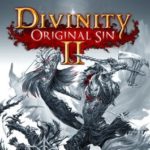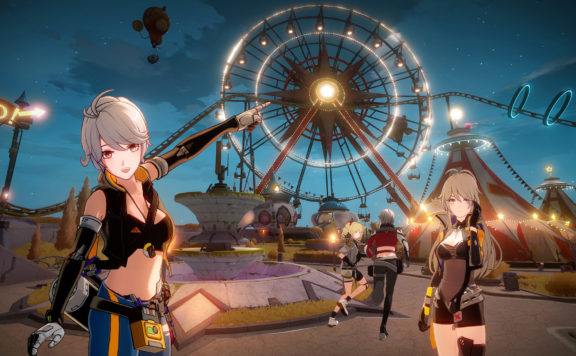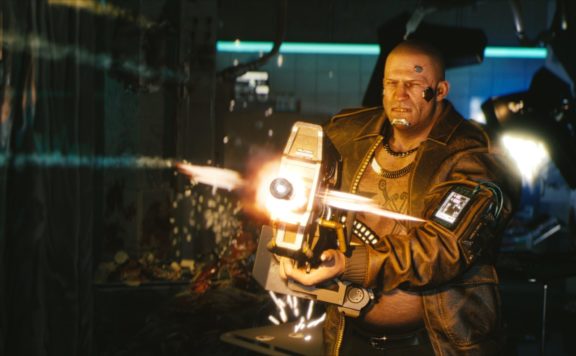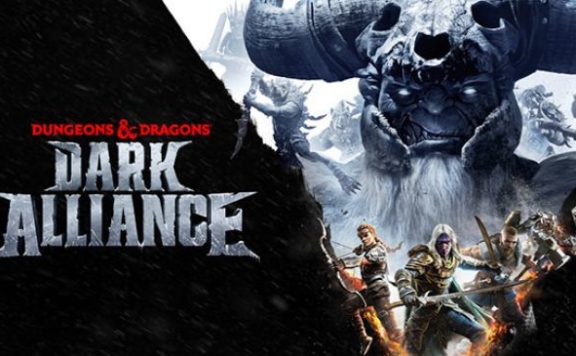On the 14th of September came a day many fans of classic-inspired CRPGs have been looking for. After the Kickstarter campaign that successfully raised over $2M (with the goal being $500k), Larian Studios has released the long-awaited sequel to Divinity: Original Sin. This is our Divinity Original Sin 2 review.
The game starts with the choice of the difficulty (more about that later) and character creation, and this is the first system by which you will be impressed. In addition to selecting one of the pre-existing Origins and taking control of one of the premade characters, Divinity gives players an option to create their own. The Origin characters will then join your hero as the companions. Customization includes choosing a race (Human, Elf, Dwarf, Lizard or even an Undead version of one of them!), gender, appearance, class (with details like attributes, skills, abilities and talents) and tags.
The tagging system is yet another incredibly interesting feature of the game providing a lot to its replay value. A tag such as Mystic, Outlaw, Hero, Pet Pal and others gives the character extra dialogue options, sometimes leading to very different results. Even a combination of tags such as Scholar + Pet Pal will expand on the basic choices. You have to make sure that you start a conversation on a correct character, though – only tags that were unlocked during the gameplay affect the whole party, while the initial ones belong only to the character that has it. Most conversations will allow you to gracefully back out and start the dialogue anew from the beginning with the correct character that has the needed tag or attributes, but there are those, which give you only one chance. The same applies to the quest items: to have the choice of a special dialogue option, the item in question needs to be in the inventory of the character who is doing the talking.
The stat checks are something of a mystery to me. Persuasions are a mixed bag and there seems to be a random roll of the dice going on behind the scenes. However, the point stands that there is no rhyme or reason to checks. Sometimes I managed to pass persuasion when I absolutely did not expect to. Other times, I failed and threw the team into battle when I truly thought I had nailed it.
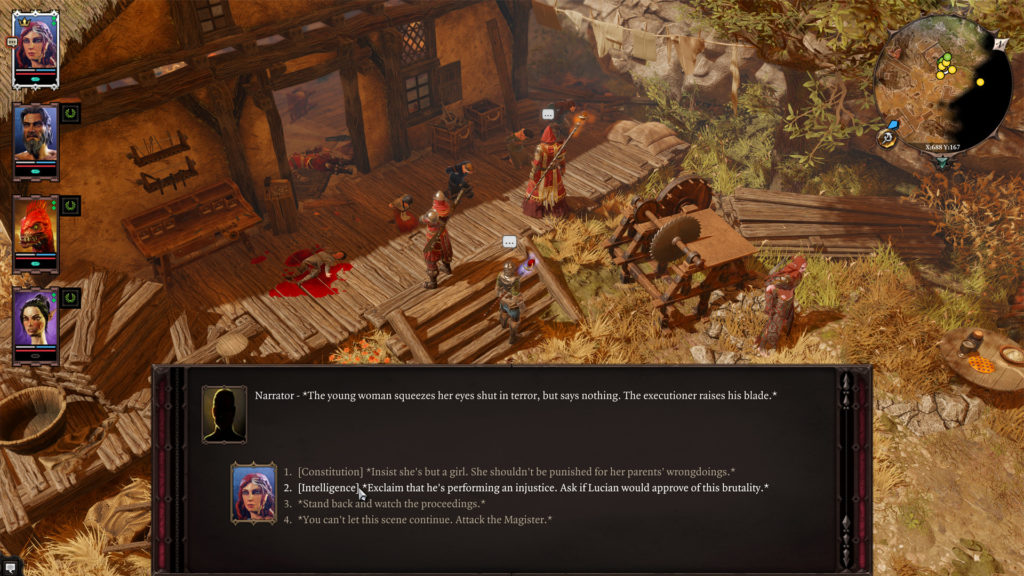
The first Divinity: Original Sin had players take on a role of Source Hunters out on a mission to eradicate those who use a special type of magic known as the Source. The sequel takes place in the same world hundreds of years later. However, this time the players are the despised and feared Sourcerers, taken to the prison-island known as Fort Joy for their use of this dangerous type of magic. The Order of Magisters is said to “cure” the Sourcerers, however, soon you will find that the truth is far more horrifying. The story is absolutely one of the strongest sides of the game.
The overarching plot is reflected in every side-quest and character interaction with just about everything’s backstory reaching out to Sourcerers, Magisters or a simple folk whose lives were forever changed due to the actions of one of the sides. The story unfolds slowly, with more and more information given to the players as they explore the world. The pace might seem too slow to some, and at a certain point I hit the “I just want to go to a different zone already!” mood myself, but altogether with the significance of side quests, superb voice-acting, the slowly changing personality of the companions and the variety of choices it feels far from dull even in the slowest moments.
Another thing that particularly appealed to me was that neither side of the conflict is portrayed as morally superior. Just as a quest would lead you to believe that what Magisters do is absolutely evil, no exceptions, you find a brazen Sourcerer who dabbed too deep into the Source and got a bunch of magic-starving Voidwoken to wipe out a couple of villages or literally rip souls out of helpless folk. There is, however, far more to the game’s story than just Sourcerers and Magisters, including a personal arc for each of the companions, but it is something for you to find out in the game on your own.
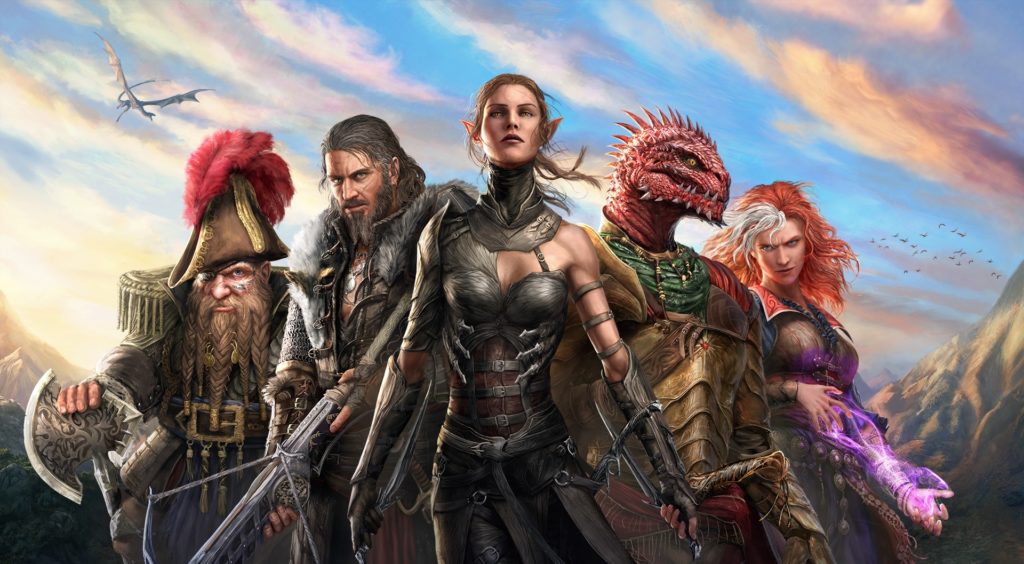
Another important part of the game that you will spend a lot of time engaged in is the combat system. The success of the battle in many ways varies on who is better aware of the surroundings and has more ways of utilizing the tools the game generously gives (but usually does not explain how to use to your advantage). Divinity rewards close attention to the details and cunning chaining of abilities and consumables while in the same time punishing hastiness and thoughtlessness. The combat is turn-based for a reason. Not paying attention to statuses can result in you killing your wounded character with the healing spell that was supposed to help them, for example. The combat controls are intuitive and easy to pick up, but the more you play, the more abilities and consumable types are at your disposal, the deeper the system becomes for you.
Certain talents allow free movement Action Points (AP), lowered cost of consumables, increased damage after a kill and much more. It allows planning with complex strategies centered on the team composition and characters’ specifics. There is also a Dragon Age: Origins like Tactical camera view that will be especially helpful in more uneven regions of the game.
There is no limit to how many abilities a character can learn, provided they have passed the requirements for it. However, there is a characteristic called “Memory” which affects a number of abilities the character can memorize at any point. Some abilities require multiple “memory slots” to be memorized and used. Certain pieces of gear also provide characters with extra abilities or ways to set harmful statuses at enemies.
It also leads to the next point: difficulty. The game feels very difficult in the beginning regardless of the setting you choose because of the lack of ways to utilize said game tools. You will also for sure run into the issues of so-called “power creep”, where the enemies become stronger at an alarming rate and the game expects you to compensate for it by always buying, fighting for, stealing or getting gear in some other way. It is almost mandatory to check vendors every time you are in a hub for new skills, potions, scrolls, flasks and usually a gear upgrade. For a short period afterwards, the game might even feel almost simple, but there will be another spike in difficulty soon.
You can save a lot of gold by utilizing the in-game crafting system. It will provide you with dozens of recipes for consumables, gear, elemental arrows and even new abilities. There is no need in limiting yourself in the resources you pick, as your backpack is literally bottomless. Repeat that with me: an endless backpack. Did I just hear all the collectors shiver at the prospect? I know I did. With that in mind, what the bag really lacks is a search option. You can sort the items by categories such as magical, equipment, ingredients and more, but sometimes even that is not enough as your backpack might have enough ingredients to fill out a middle-sized house and then some.
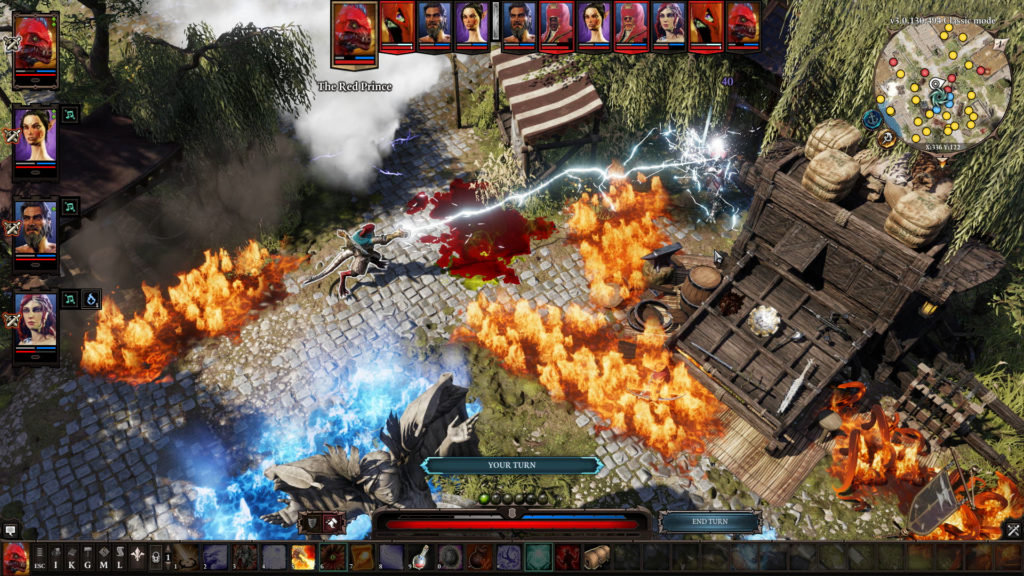
The game world is stuffed with interactable objects, talking animals (pick Pet Pal, you will thank me later) and even chattering ghosts. Due to the amount of interactive content packed so densely into the game, it sometimes can be hard to navigate your characters around more crowded areas. You might accidentally click on an item or a character you did not intend to or attempt to steal something which will lead to a frosty reaction (and from time to time combat with the enraged owner of the darned thing).
With the amount of the quests and tasks available in the game, it would have been perfect to have an MMO-style quest tracker. Instead, Divinity provides players with a quest journal that regularly updates (or does not, which also happens frequently) with the latest events. The map provides helpful flags with the names of the locations and even indication of a quest character’s position. Additionally, you can place your own flags and mark what it is you wanted to point out.
Divinity: Original Sin 2 is one of the best story-driven CRPGs of late and the year has not been shy of them. For me, it hit certain marks that Tyranny or Tides of Numenera might have missed. Perhaps, it is the ability to plunge into the co-op and share the usually single-player high-quality RPG experience in a much more nuanced way than just by words or via streaming. The atmospheric soundtracks, fully narrated and voiced epic story, deep characters (you can romance your companions, too! Beware, Bioware!), puzzles, secrets and the obvious love the developers have put into the game will make sure your stay in the world of Divinity is an enjoyable one even if it is not your usual type of the game.
Plus, you can talk to animals.
This review was accomplished by way of a key provided by the publisher, though I am also a KickStarter backer.

